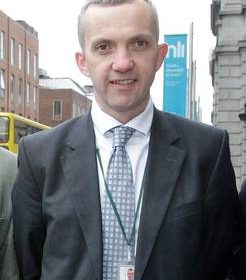Patients 'coached to fast-track sex change treatment'

Vulnerable patients are being “coached” on how to outwit a psychological evaluation in order to gain access to hormone treatment and gender-related surgery, it has been claimed.
Ireland’s leading endocrinologist, Professor Donal O’Shea, has warned that he believes some advocacy groups are prepping patients to fast-track their way to gender transition – without undergoing an appropriate mental health assessment.
Please log in or register with Independent.ie for free access to this article.
Log In
New to Independent.ie? Create an account
“I have had a number of patients who have told me that they have been coached in the answers to give so that they give the ‘right’ answers to psychologists and psychiatrists who will be asking them questions before receiving hormone treatment and gaining access to surgery,” Prof O’Shea said.
“And I have been told by patients who have had hormone treatment, who have had surgery, who are now unhappy with their decision, that they have been instructed by patient advocates not to report this because it would be bad for the wider community.”
Prof O’Shea says a holistic assessment is vital to separate individuals who are simply “gender questioning” from those with clear and stable gender dysphoria – that is, distress due to a mismatch between gender identity and their sex as assigned at birth.
He stresses the difference between “a patient who tells you ‘from as long as I can remember I have always wanted and always felt that I am in the wrong body’ and a patient who says ‘I wasn’t really sure until I was 14 or 15 and then I began to think about it and initially I wondered if maybe I am gay’.
“The holistic assessment by our team – which now includes a speech and language therapist and a social worker as well as psychologists and psychiatrists – is looking for a clear and stable gender identity. Then we are comfortable that an individual should start treatment. But now we know patients are being coached to give a story of ‘clear and stable’ because they know that may get them on to treatment quickly,” he explains.
Patients with special needs are also being given suggestions on how to get past the assessment says Prof O’Shea: “There are people being coached, including those on the autistic spectrum.”
He said: “One particular area of concern is the increase in gender questioning that you see in the autistic spectrum group of adolescents and young adults.”
Speaking about this vulnerable patient group, he said: “Individuals who have autistic spectrum disorder are much more likely to gender question and we have seen a very big increase in the numbers with autistic spectrum and gender issues being referred to us. And the reason for it isn’t understood. There has been such an increase in the prevalence of it over the last 15-20 years that we are trying to come to terms with what is underlying that.
“Is there a true biological explanation for it? Is there something that is causing an increase in autistic spectrum and an increase in gender questioning? Is it linked to the visibility around Kardashian personality Caitlyn Jenner – is it linked to that kind of visibility?
“There are 70 different terms for gender on Facebook and over 300 in total if you go on the world wide web, so there is an explosion in visibility. And within the field of medicine, if any condition changes rapidly you have to take even more care with managing it and making sure you are doing the right thing for the individual – and with all the right supports in place. This explosion in visibility and referrals for care needs to be matched with greater attention to assessment and medical management of gender issues.”
Some advocacy groups are calling for an ”informed consent” model, which means the individual who seeks transition will be assisted so long as they state that they fully understand what is involved and agree to it. However, Prof O’Shea advocates the holistic model of care, where the ultimate decisions about treatments ranging from hormones to surgery, are made jointly with the individual once a detailed psychosocial assessment has been carried out. This will allow even the most vulnerable individuals to progress safely on their gender journey.
“I have been 25 years dealing with individuals transitioning; allowing a model where the patients would come forward and say ‘I have read about the condition and I would like the treatment’ is a recipe for multiple disasters.
“It would be like if a patient who had pneumonia came to see me and said ‘I have read about pneumonia and I would like my lung removed.’ It’s my duty of care to inform the person that ‘taking your lung out would be an over-reaction here and would be negligent on my part, so let’s try a week of antibiotics first’. Our job is to make sure that the treatment is right for that individual and that the options and implications are explained.”
A spokesperson for one Irish advocacy group, BeLonG To, said: “BeLonG To Youth Services supports LGBTI+ young people across Ireland through the provision of youth groups, crisis counselling and information. This work does not include coaching transgender and non-binary young people in relation to psychological examinations.”
TENI, an organisation supporting the trans community in Ireland, said no one was available for comment.
Source: Read Full Article